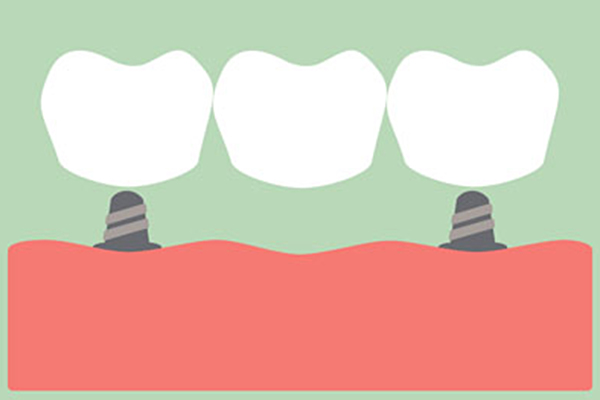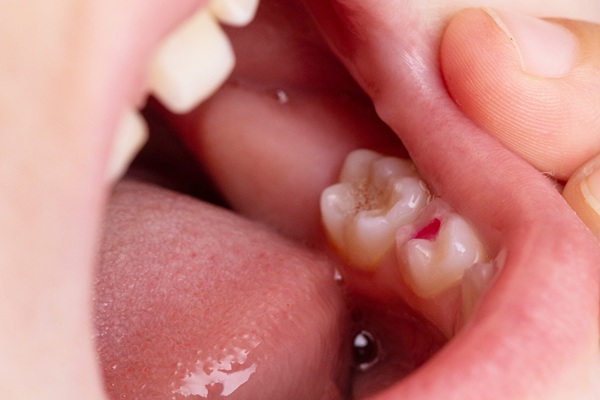When a Dental Bridge Is Recommended

If you are seeking tooth replacement options, a dental bridge can often be the treatment suggested by a dentist. There are many benefits that come with using a dental bridge to replace one or more missing teeth. Replacing a lost tooth covers the gap left by the missing tooth to prevent the remaining teeth from moving or shifting out of place. Also, you can enjoy dental functions like chewing and speech once more.
When is a dental bridge recommended?
A dental bridge replaces one or more missing teeth in a row. It is anchored into place by each adjacent tooth on the side of the gap. This keeps the bridge steady and functional. The bridge placement procedure usually takes two dental appointments, making it a highly convenient tooth replacement choice. A patient may require a bridge if a tooth suffers such severe decay that it falls out or gets extracted, or an accident damages the tooth beyond repair.
Some of the reasons a dental bridge might be recommended include the following.
Quick procedure
A dental bridge is often recommended because it can be completed quickly. Bridges are suitable for those who have just lost their teeth and seek a fast and reliable option. Patients can get an aesthetically pleasing smile in only two appointments. In contrast, an option like implant-supported dentures would take at least two months to achieve a fully functioning smile, since the posts need to integrate with the jawbone.
Patient’s health condition
Another reason dental bridges might be advisable is directly related to the health condition of the patient. Some patients are not able to undergo major procedures due to conditions like cancer, diabetes, medications, or autoimmune disease. Also, the condition of their mouth may not allow for the bone grafting or healing process. Patients may need to opt for a dental bridge if they have insufficient bone density and would likely require extensive bone grafting.
Number and location of missing teeth
When no more than three teeth are missing consecutively, the dentist might recommend getting a dental crown. The nearby teeth need to be strong enough to provide adequate support. Also, bridges are usually preferred for front row teeth instead of the back teeth because of the level of force bridges can withstand.
Types of dental bridges
There are different types of bridges available for those seeking teeth replacement. These include traditional bridges, Maryland bridges, cantilever bridges, and implant-supported bridges. This gives patients a variety of options, depending on their specific condition. Bridges are strong and reliable, and when produced correctly, can match the feel and appearance of the natural teeth closely.
The bottom line
A missing tooth or teeth is the basic requirement for needing a dental bridge. However, you need to find an option that works best for your smile and that also fits your preferences. The earlier you have the missing teeth replaced, the better. If you have questions, contact our dental office to schedule an appointment with our dentist, who will be ready to answer your questions and provide recommendations.
Request an appointment here: https://www.hudsonfamilydental-gj.com or call Hudson Family Dental at (970) 305-8727 for an appointment in our Grand Junction office.
Check out what others are saying about our dental services on Yelp: Dental Bridges in Grand Junction, CO.
Recent Posts
A traditional dental bridge can replace up to three or four consecutive teeth on the same side of a dental arch. It is one of the most common dental replacements you can get. Knowing how to care for it can help maintain your new smile for a long time. Here are some tips for ensuring…
When it comes to replacing missing teeth, you can choose between options like dentures or a dental bridge. The last thing you want to do is leave the missing teeth unreplaced as it can have undesirable consequences on oral health. This article explains what a dental bridge is, how it works, and how many teeth…
Same day crown technology has made it possible for patients to get a crown over a tooth on the same day as their dental appointment. Crowns, commonly known as "caps," can treat a broad range of dental problems. They are used to treat decayed parts of teeth, replace a missing tooth as part of a…
Implant crowns are a great way to achieve a natural-looking dental restoration. More patients are considering this restorative measure to bring their teeth back to life.If you are considering implant crowns, it’s important to understand what they are, as well as how they work with dental implants. The entire process should be discussed with a…


